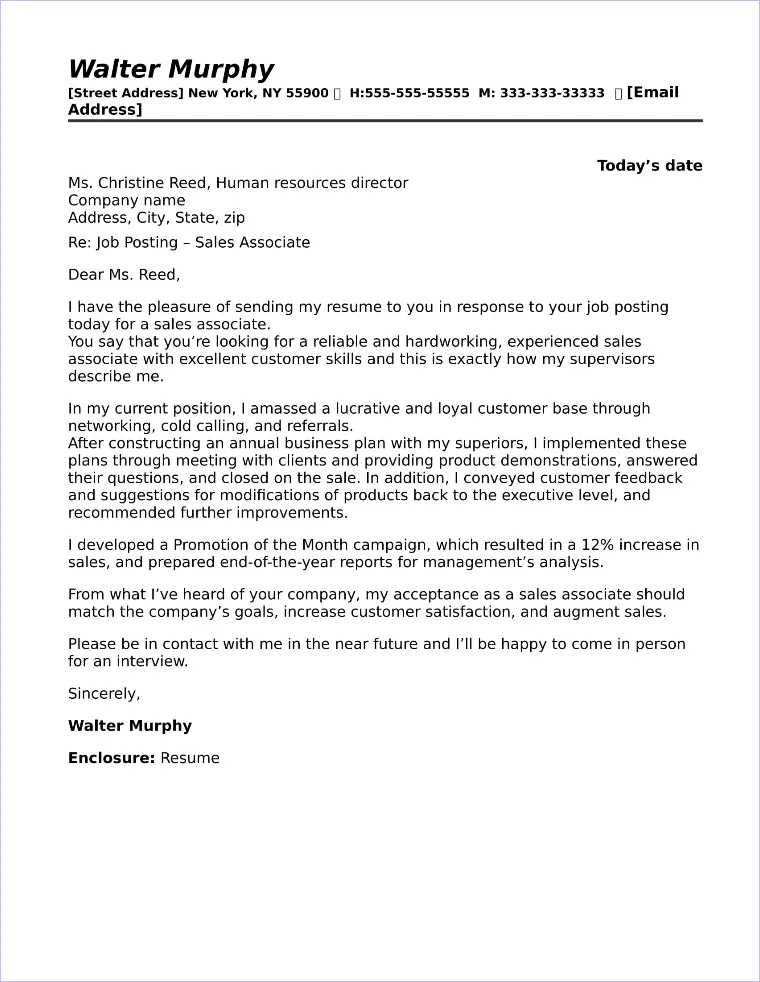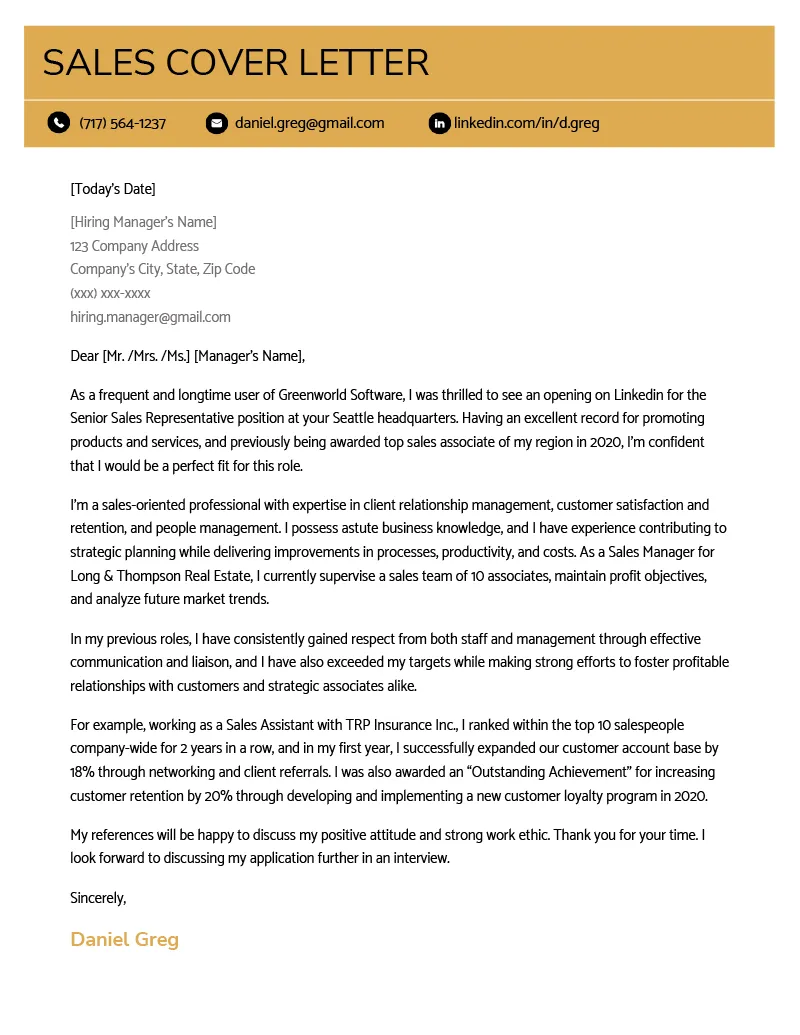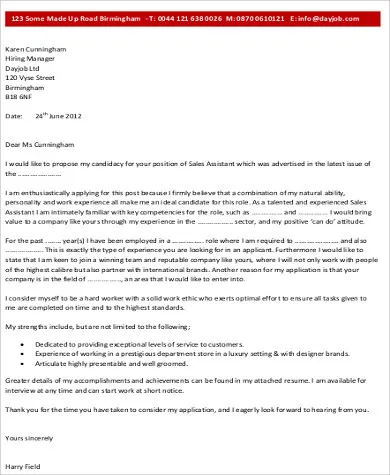Why a Great Sales Associate Cover Letter Matters
In the competitive landscape of job applications, a well-crafted sales associate cover letter is your first impression. It’s the initial opportunity to showcase your personality, skills, and enthusiasm to a potential employer. A compelling cover letter goes beyond simply restating your resume; it tells a story, highlighting your unique value proposition and why you’re the perfect fit for the role. A poorly written or generic cover letter can be an immediate deal-breaker, leading to your application being overlooked. On the other hand, a standout letter can significantly increase your chances of landing an interview and ultimately, the job. Think of it as your personal sales pitch to the hiring manager, convincing them to invest their time in learning more about you.
The cover letter is where you get to express your genuine interest in the company and the specific sales associate position. It allows you to connect your skills and experiences directly to the job requirements, demonstrating a clear understanding of the company’s needs and how you can contribute to their success. Moreover, the cover letter shows that you care enough to put in the extra effort. It is a signal that you’ve taken the time to research the company and tailor your application, showcasing your attention to detail and commitment to excellence. This effort often sets you apart from other applicants who may have simply submitted a resume without any additional context or personalization.
How to Write a Compelling Cover Letter
To write a compelling cover letter, begin with a strong opening that grabs the reader’s attention. Instead of a generic greeting, address the hiring manager by name, if possible. Research the company and the specific role to show genuine interest and tailor your letter accordingly. In the opening paragraph, immediately state the position you’re applying for and briefly mention where you saw the advertisement. Then, express your enthusiasm for the company and the opportunity. The body of the letter should highlight your most relevant skills and experiences, demonstrating how they align with the job requirements. Provide specific examples to showcase your accomplishments and quantify your achievements whenever possible.
Structure your letter logically, using clear and concise language. Avoid jargon and overly complex sentences. Each paragraph should focus on a specific aspect of your qualifications and how they relate to the job. Keep the tone professional, but also inject some of your personality to help you stand out. In the closing paragraph, reiterate your interest in the position and express your eagerness for an interview. Thank the hiring manager for their time and consideration, and provide your contact information for easy access. Always proofread your cover letter carefully for any grammatical errors or typos, which can undermine your professionalism. Consider using a template to help structure your letter, but make sure to customize it to reflect your own unique experiences and the specific requirements of the job.
Highlighting Your Sales Skills

Your cover letter should be a showcase of your sales skills. Emphasize the abilities that make you a successful sales associate. Include your communication skills, both written and verbal, highlighting your ability to connect with customers and build rapport. Mention your active listening skills, the ability to understand customer needs, and provide tailored solutions. Include any experience with sales techniques, such as prospecting, closing deals, and upselling or cross-selling. Showcase your negotiation skills and ability to handle objections, demonstrating your resilience and customer-centric approach. Also, mention your knowledge of sales software, CRM systems, and any other tools relevant to the sales process. Make sure to convey your understanding of sales metrics and your ability to meet and exceed sales targets. Emphasize your ability to work independently and as part of a team. And, don’t forget to display enthusiasm for sales and a genuine desire to help customers.
When highlighting your sales skills, use action verbs to describe your accomplishments. For example, instead of saying ‘I was responsible for customer service,’ say ‘I provided exceptional customer service, resulting in a 15% increase in customer satisfaction.’ This helps to create a vivid picture of your abilities and achievements. Tailor the skills you highlight to match the specific requirements of the job. Review the job description carefully and focus on the skills and experience that the employer is looking for. Also, it’s helpful to include specific examples of how you’ve used your sales skills to achieve positive results in the past. The more specific your examples, the more credible your claims will be.
Quantifying Achievements for Impact
Numbers speak volumes. Quantifying your achievements makes your cover letter much more impactful and demonstrates your value to potential employers. Instead of vaguely stating that you ‘increased sales,’ specify by how much. For instance, ‘Increased sales by 20% within six months through proactive customer engagement and upselling strategies.’ Use percentages, dollar amounts, or other metrics to illustrate your successes. Did you exceed sales targets? Mention the percentage by which you exceeded them. Did you improve customer retention rates? Specify the percentage increase. Were you able to close a certain number of deals within a specific timeframe? Provide those exact figures. Quantifying your achievements creates a clear picture of your capabilities and shows the tangible results you’ve delivered in previous roles.
When quantifying your achievements, focus on the results that are most relevant to the job. If the job description emphasizes customer satisfaction, highlight any improvements you made in that area, such as a reduction in customer complaints or an increase in positive reviews. If the job focuses on revenue generation, showcase your ability to meet or exceed sales targets. To gather this information, review your past performance reviews, sales reports, and any other metrics that track your achievements. Even small improvements can make a big impact when they are quantified. For example, ‘Successfully implemented a new customer outreach strategy that resulted in a 5% increase in lead generation.’ Highlighting quantifiable achievements will make your cover letter more compelling and help you stand out from other applicants.
Tailoring Your Letter to the Job
Customizing your cover letter for each job application is essential. Generic, one-size-fits-all cover letters are easily recognizable and often discarded by hiring managers. Instead, show that you have taken the time to understand the specific requirements of the role and the needs of the company. Start by carefully reading the job description. Identify the key skills, experience, and qualifications that the employer is looking for. Research the company to learn about its products, services, values, and culture. Then, tailor your cover letter to address these specific aspects.
Highlight the skills and experiences that align with the job description, using keywords from the job posting to demonstrate your relevance. Provide examples from your past experiences that demonstrate how you have successfully used these skills. If the job description mentions specific software or tools, make sure to include any relevant experience you have with them. Show that you have researched the company and understand its mission. Mention the company’s products or services and explain how you would contribute to their success. Customize your letter’s tone and language to align with the company’s brand. By tailoring your cover letter, you will demonstrate your genuine interest in the position and increase your chances of getting an interview. Make sure to avoid reusing the same cover letter for different applications; it’s worth investing time in customizing each letter to showcase why you are the best fit for each opportunity.
Formatting and Tone

Formatting and tone are crucial elements in crafting a professional cover letter. Maintain a professional and courteous tone throughout the letter. Use clear and concise language, avoiding jargon or overly complex sentences. Keep your paragraphs short and focused, making the letter easy to read and understand. Choose a professional and readable font, such as Times New Roman, Arial, or Calibri, with a font size of 11 or 12 points. Use a standard business letter format, including your contact information, the date, the hiring manager’s name and title, and a clear subject line. Always address the hiring manager by name if possible. If you are unsure of the name, you can use a general greeting like ‘Dear Hiring Manager’.
The tone of your cover letter should reflect your enthusiasm and interest in the position, while still maintaining a professional demeanor. Avoid being overly casual or informal. Show confidence in your abilities, but don’t come across as arrogant. Be enthusiastic, but avoid hyperbole. Ensure your cover letter looks visually appealing and is well-organized. Use white space effectively to create a balanced and uncluttered appearance. Proofread your cover letter carefully for any grammatical errors, spelling mistakes, or typos. Consider having a friend or colleague review it for you to catch any errors that you might have missed. A well-formatted and well-written cover letter will make a positive first impression and demonstrate your attention to detail and professionalism.
Proofreading and Editing
Proofreading and editing are crucial steps in the cover letter writing process. Errors in grammar, spelling, or punctuation can undermine your credibility and professionalism, potentially costing you the job opportunity. Start by proofreading your cover letter carefully yourself. Read it multiple times, focusing on different aspects each time. Check for grammatical errors, such as incorrect verb tenses, subject-verb agreement issues, and incorrect use of pronouns. Ensure your spelling is accurate. Use a spell-checker, but don’t rely on it completely, as it may not catch all errors. Pay close attention to punctuation, including commas, periods, semicolons, and colons. Make sure your sentences are well-structured and easy to read.
After proofreading your cover letter yourself, have someone else review it. A fresh pair of eyes can often catch errors that you might have missed. Ask a friend, family member, or career advisor to read your cover letter and provide feedback. Pay attention to their comments and suggestions. They can often identify areas where your writing could be improved. Check for clarity and coherence. Make sure your cover letter clearly and effectively communicates your message. Ensure your writing is concise and avoids unnecessary jargon or wordiness. Review the tone of your letter. Does it sound professional and enthusiastic? Does it reflect your personality and style? Finally, ensure your contact information is accurate and up-to-date. Provide your full name, phone number, email address, and any other relevant information. A polished and error-free cover letter will increase your chances of getting an interview and landing your dream job.
Key Takeaways to Win the Job
In conclusion, a compelling sales associate cover letter is a vital tool in your job search. It’s your chance to showcase your skills, experiences, and enthusiasm to potential employers. To write a winning cover letter, start by emphasizing your understanding of the role and the company. Highlight your relevant sales skills, quantifying your achievements to demonstrate your impact. Tailor your letter to each job application, showcasing your genuine interest and attention to detail. Maintain a professional tone, use clear formatting, and proofread your letter carefully to eliminate any errors. Remember that your cover letter is not just a formality; it is a critical opportunity to make a positive first impression and increase your chances of getting an interview. By following these key takeaways, you can craft a cover letter that sets you apart and helps you land your desired sales associate position.
By putting in the effort to create a well-crafted cover letter, you can significantly boost your chances of securing an interview. Think of it as your personal sales pitch, demonstrating your value to the employer and convincing them that you are the perfect candidate. Remember to always customize your cover letter for each job, highlighting your unique skills and experiences that align with the specific requirements. Proofread carefully, and seek feedback from others to ensure your letter is error-free and effective. With a strong cover letter, you can make a lasting impression and take a significant step towards your career goals as a sales associate. Good luck, and happy job hunting!
